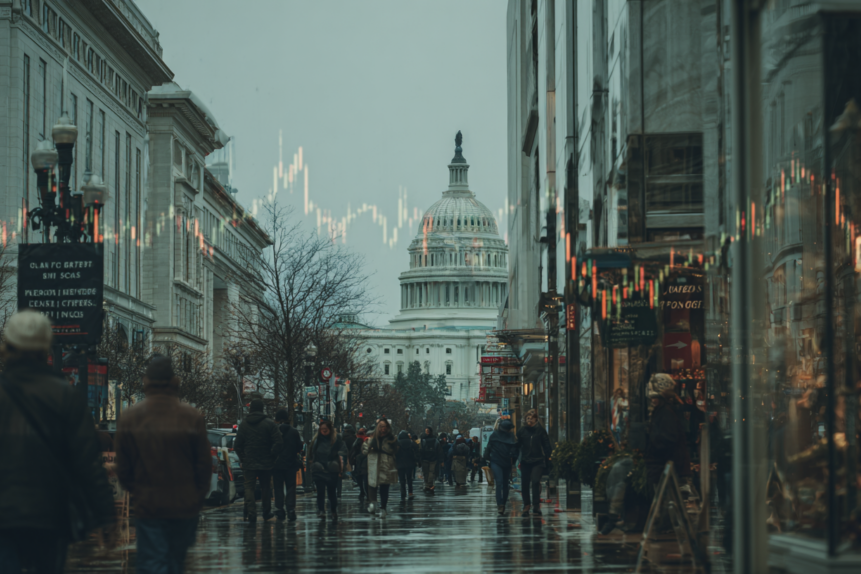Copyright Benzinga

A prolonged federal government shutdown is hitting Washington D.C.’s economy hard, with consumer spending now falling at rates not seen since the 2008 financial crisis, raising fears of deeper economic disruptions if the deadlock continues. Spending In The Capital Slumps At A Pace Unseen Since The GFC Consumer behavior in Washington D.C. is shifting drastically as the shutdown enters its 27th day. Year-over-year credit and debit card spending declined 1.4% in the week ending Oct. 18, according to Bank of America Institute data — the steepest drop since the aftermath of the 2008 financial crisis. David Michael Tinsley, a senior economist at the Bank of America Institute, said early indicators from card data show that D.C. residents have pulled back significantly since the shutdown began on Oct. 1. The collapse in spending comes amid rising uncertainty, with no clear resolution in sight. According to betting market Kalshi, there’s a 78% chance the shutdown will last more than 35 days — a new record if realized. The median expectation points to a resolution around Nov. 13, extending the economic strain deeper into the fall and potentially disrupting consumer behavior ahead of Thanksgiving. No Paychecks, No Spending: Shutdown Starts to Bite Oxford Economics says most federal workers were paid through Oct. 10, but began missing full paychecks as of Oct. 24. "There is no obvious end to the shutdown on the immediate horizon," said Nancy Vanden Houten, lead U.S. economist at Oxford Economics. Even if a bipartisan bill to pay workers is passed, contractors remain at risk. "Federal contractors won’t [get paid], raising the risk they have to furlough or lay off their workers," Vanden Houten said. She also warned that as the Thanksgiving holiday approaches, delays to air travel caused by unpaid TSA and air traffic control workers could fuel public frustration. Meanwhile, recipients of Supplemental Nutrition Assistance Program (SNAP) benefits could be next to feel the pain. More than a dozen states have alerted residents about possible benefit disruptions beginning in November. "The Trump administration may be able to find funds to pay at least partial benefits, but the uncertainty among beneficiaries may cause these households to pare back other types of spending," Vanden Houten said. Eagle Bancorp Suffers as Shutdown Weighs on D.C. Lending Shares of Eagle Bancorp (NASDAQ:EGBN), a regional lender heavily exposed to the D.C.-Maryland-Virginia market, have dropped over 12% since the shutdown began — far worse than the 3.3% decline in the broader regional bank index over the same period. However, executives on the bank's Oct. 23 earnings call said they haven't yet seen material pressure on their government contractor clients, with CFO Eric Newell noting that line-of-credit usage among this group has declined by 30% — a potential sign of improved liquidity rather than stress. "We haven't seen much of any concerns in the government contracting space… the bias of our portfolio is in defense and security," Newell said. The bank posted a net loss of $67.5 million for the third quarter, driven by continued losses in its commercial real estate portfolio, especially office and multifamily assets. Criticized and classified loans rose to $958 million, up from $875 million in the prior quarter, primarily due to $204 million in newly downgraded multifamily loans. Eagle’s management emphasized that these credit issues stem from higher rates and valuation pressures — not shutdown-linked disruptions. Read Next: Tech’s Hottest Rally Since 2000 Meets The Most Bullish Month Image created using artificial intelligence via Midjourney.



